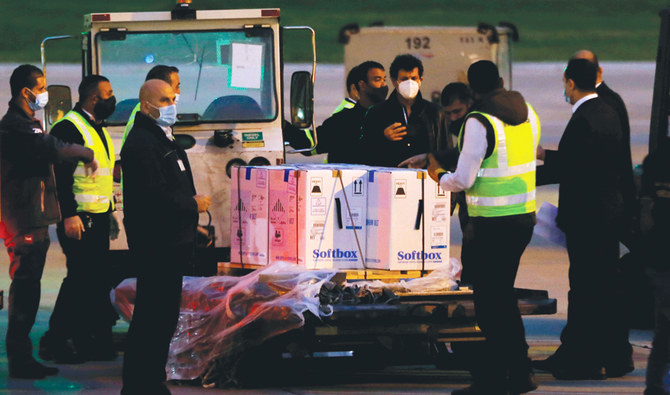
By NAJIA HOUSSARI — arabnews.com — BEIRUT: Lebanon has launched an urgent coronavirus vaccination rollout following the arrival of the first batch of the Pfizer-BioNTech vaccine at Beirut’s Rafic Hariri International Airport. The consignment of 28,500 vaccines arrived from Belgium and was transferred to the Ministry of Health for storage and distribution to approved medical centers and hospitals. Medical and nursing staff as well as paramedics working in coronavirus departments in the country’s hospitals will be among the first to be treated when the rollout begins on Sunday. About 150 people will be vaccinated in three hospitals in Beirut, with the number expected to increase to between 300 and 400 per day by next week in 17 centers across the country. At least 57 vaccination centers are expected to be operating within three weeks. Care homes for the elderly will also be included early in the vaccination program, Reda Al-Mousawi, media adviser at the Ministry of Health, said.
Lebanese hospitals have struggled in the past year amid the country’s acute financial crisis and some of the region’s highest coronavirus infection rates. The total number of virus cases in Lebanon reached 334,086 and 2,462 deaths. Dr. Abdul Rahman Bizri, an infectious disease specialist and head of the National Committee for the Administration of Corona Vaccine, told Arab News that the first people to receive the vaccine will be identified by the three hospitals, which will begin vaccinations on Sunday. “I have not been informed that the president, parliamentary speaker and the prime minister will be first to receive the vaccine,” he added. Bizri said that hospitals have rehearsed their vaccination procedures before opening their doors next week. “We have learned from the mistakes of the Americans and French, and are trying to avoid the same issues,” he said.
The AstraZeneca vaccine due to arrive in Lebanon in about two weeks will offer greater flexibility to cover all Lebanese regions, Bizri said. He declined to set a ceiling for the duration of the vaccination process, saying: “It depends on the quantity of the vaccine provided and the behavior of the people. I think that with the start of the vaccination process, people will be more encouraged.” More than half-a-million people out of a population of 4 million have registered to be inoculated via a health ministry platform. Ministry hotlines are handling inquiries from those who are reluctant to take the vaccine. Community health specialist Dr. Ahmad Mughrabi blamed so-called vaccine hesitancy on “distorted messages circulating on social media and the attitudes of some celebrities who say they will not be inoculated.”
Mughrabi said that people in the street and his neighbors “frequently ask questions about the disadvantages of the vaccine and the fear of it, especially unconventional vaccines.” “The media and the social media in Lebanon bear a great responsibility for confusing people,” he said. “No one is trying to reassure people.” Mughrabi said that he fears Lebanon will struggle to complete the vaccination campaign within two or three months, adding: “What is the benefit of vaccination in light of the social spread of the virus?.”



